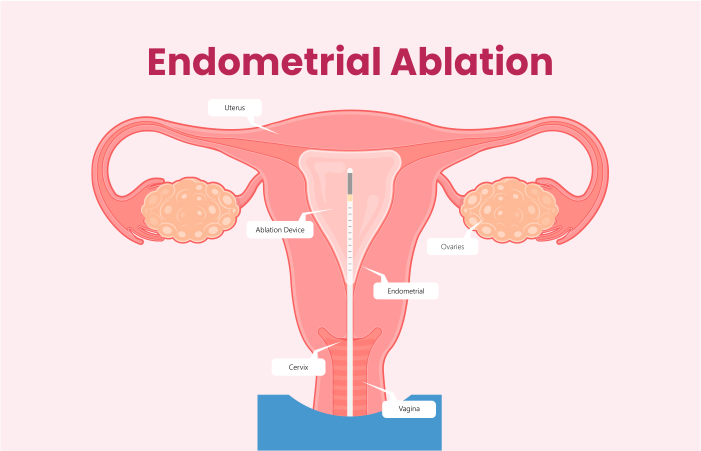Endometrial Ablation in Hyderabad

What is Endometrial Ablation?
If you’re experiencing heavy or prolonged menstrual bleeding and are seeking a solution that doesn’t involve major surgery, endometrial ablation may be the answer you’ve been looking for. Best Endometrial Ablation treatment hospital in Hyderabad, we specialize in providing state-of-the-art endometrial ablation treatments to help women find relief from bothersome menstrual symptoms and regain control over their lives.

Why is Endometrial Ablation Performed?
Endometrial ablation is typically performed for women who experience heavy menstrual bleeding, also known as menorrhagia, that significantly interferes with their quality of life. The procedure is suitable for women who have completed childbearing or have no desire for future pregnancies. Endometrial ablation may be recommended when more conservative treatments, such as medication or hormonal therapies, have not provided adequate relief.
How to Prepare for Endometrial Ablation?
Preparing for endometrial ablation involves a few essential steps to ensure a successful procedure and recovery. Your healthcare provider at our Hyderabad center will guide you through the process, which may include:
- Initial Consultation: During your consultation, your healthcare provider will evaluate your medical history, conduct a physical examination, and discuss your symptoms in detail. This information will help determine if endometrial ablation is the appropriate treatment for you.
- Preoperative Evaluation: You may undergo certain tests, such as an ultrasound or hysteroscopy, to evaluate the condition of your uterus and rule out any underlying abnormalities or conditions.
- Medication Review: Your healthcare provider will review your current medications, including any blood-thinning medications, and provide instructions on which ones to continue or discontinue before the procedure.
- Preoperative Instructions: You will receive specific instructions regarding fasting before the procedure, arranging for transportation to and from the clinic, and any necessary preoperative preparations.
Consequences of Delaying Endometrial Ablation
Delaying endometrial ablation treatment can have significant consequences on your quality of life and overall well-being. By seeking timely intervention, you can avoid the following challenges associated with untreated menorrhagia:
- Impaired Quality of Life: Heavy menstrual bleeding can interfere with your daily activities, social life, work productivity, and overall quality of life. Seeking endometrial ablation treatment can help you regain control and improve your well-being.
- Anemia: Chronic heavy menstrual bleeding can lead to iron deficiency anemia, resulting in fatigue, weakness, shortness of breath, and other symptoms. Endometrial ablation can reduce or eliminate excessive bleeding, preventing the development or worsening of anemia.
- Limited Treatment Options: Delaying endometrial ablation may result in continued reliance on medications, hormonal therapies, or other temporary solutions. These treatments may provide only temporary relief and fail to address the underlying cause of heavy bleeding.
- Unnecessary Suffering: Living with prolonged or heavy menstrual bleeding can cause emotional distress, anxiety, and a decreased sense of well-being. By opting for endometrial ablation, you can alleviate these symptoms and improve your overall mental health.
Frequently Asked Questions (FAQs)
The duration of the endometrial ablation procedure can vary depending on the specific technique used and the individual case. On average, the procedure typically takes around 30 minutes to an hour.
Endometrial ablation is designed to provide long-term relief from heavy menstrual bleeding. While it is highly effective in reducing or eliminating menstrual flow, it is important to note that it may not be a permanent solution for everyone. Some women may experience a recurrence of menstrual bleeding in the future.
Endometrial ablation is not recommended for women who wish to have children in the future. The procedure is intended for women who have completed their childbearing or have no desire for future pregnancies. Endometrial ablation significantly reduces the chances of conception and may increase the risks of complications during pregnancy.
Endometrial ablation is generally considered a safe procedure. However, as with any medical intervention, there are certain risks involved. These can include infection, bleeding, perforation of the uterus, damage to nearby organs, and adverse reactions to anesthesia. Your healthcare provider will discuss these risks with you and take appropriate measures to minimize them.
Recovery after endometrial ablation is typically straightforward and requires minimal downtime. Most women can resume their normal activities within a day or two following the procedure. You may experience some mild cramping, spotting, or discharge for a few days to weeks. Your healthcare provider will provide you with post-procedure instructions and any necessary pain management measures.









